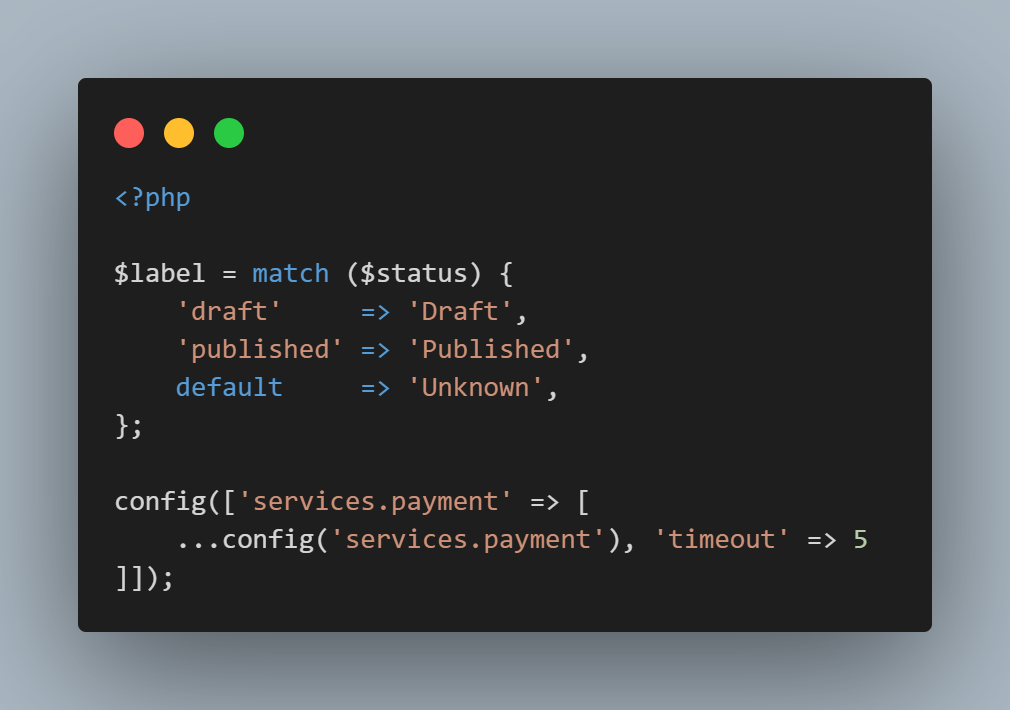7 PHP Operators That Made My Laravel Code Smarter and Sharper
Posted by Kosal

After spending years tangled in nested conditionals and bloated logic blocks, I finally stumbled upon a set of PHP operators that completely reshaped how I write Laravel applications. These aren't your standard beginner tips — they’re high-leverage tools that deliver clean, safe, and readable code. Ready to level up your PHP game? Let’s dive in.
1. The Null-Safe Operator ?->
Old Pain: Navigating object chains with a pile of isset() checks or exploding on nulls.
$country = null;
if ($user && $user->profile && $user->profile->country) {
$country = $user->profile->country;
}
Modern Way:
$country = $user?->profile?->country;
Why It’s Powerful:
No more tedious guards — it gracefully exits if any part of the chain is null, preventing runtime errors and keeping your logic clean. Bonus: it also works with method calls.
2. Null Coalescing Assignment ??=
Old Pain: Checking and assigning default values felt unnecessarily verbose.
if (!isset($config['timeout'])) {
$config['timeout'] = 30;
}
Modern Way:
$config['timeout'] ??= 30;
Why It’s Powerful:
This one-liner only assigns if the value doesn’t already exist. It’s concise, expressive, and avoids repetition. A true win for configuration management or defaults.
3. The Spread Operator ...
Old Pain: Manually merging arrays or relying on outdated func_get_args() logic.
$config = array_merge($defaults, $overrides);
function sum() {
$args = func_get_args();
return array_sum($args);
}
Modern Way:
$config = [...$defaults, ...$overrides];
function sum(...$numbers) {
return array_sum($numbers);
}
Why It’s Powerful:
Whether you're combining arrays or accepting variable-length arguments, spread syntax gives you elegance and clarity in one swoop.
4. Match Expression match
Old Pain: switch statements are lengthy, less readable, and loosely typed.
switch ($status) {
case 'draft': $label = 'Draft'; break;
case 'published': $label = 'Published'; break;
default: $label = 'Unknown';
}
Modern Way:
$label = match ($status) {
'draft' => 'Draft',
'published' => 'Published',
default => 'Unknown',
};
Why It’s Powerful:
match uses strict comparison and directly returns values. Less boilerplate, fewer bugs.
5. Spaceship Operator <=>
Old Pain: Sorting with custom comparison functions was clunky and repetitive.
usort($items, function($a, $b) {
if ($a->score == $b->score) return 0;
return $a->score < $b->score ? -1 : 1;
})
Modern Way:
usort($items, fn($a, $b) => $a->score <=> $b->score);
Why It’s Powerful:
Performs a three-way comparison in one line. Perfect for sorting by numbers, strings, or timestamps.
6. Null Coalescing ?? vs. Elvis ?:
Old Pain: Confusion between truthy/falsy checks and null checks.
// This fails if the value is 0 or ''
$label = $_POST['label'] ?: 'Untitled'
Modern Way:
$label = $_POST['label'] ?? 'Untitled';
Why It’s Powerful:
Use ?? when you only want to fall back on null or undefined. Use ?: when treating falsy values ('', 0, etc.) as equivalent to missing.
7. Chained Null Coalescing
Old Pain: Nesting ternaries to pick the first available value felt messy.
$value = isset($a) ? $a : (isset($b) ? $b : $c);
Modern Way:
$value = $a ?? $b ?? $c;
Why It’s Powerful:
Cleanly cascade through any number of fallbacks without complex logic trees.
🛠 Laravel-Specific Use Cases
-
Blade Null Handling
{{ $user?->name ?? 'Guest' }} -
Status Handling via Match
$message = match ($response->status()) { 200 => 'Success', 404 => 'Page Missing', default => 'Unhandled Error', }; -
Merge Config with Spread
config([ 'services.payment' => [...config('services.payment'), 'timeout' => 5] ]);
✅ Compatibility Check
All of these features are solid and production-ready:
match,?->,...— introduced in PHP 8.0??=— available since PHP 7.4
They not only simplify your codebase but can also slightly improve performance by reducing the number of function calls and conditional branches.
Final Thoughts
If your Laravel code still looks like it’s stuck in 2015, it’s time for an upgrade. These operators aren't just syntactic sugar — they're a fundamental shift in how we write expressive, robust PHP code.
Keep coding smart. ✌️